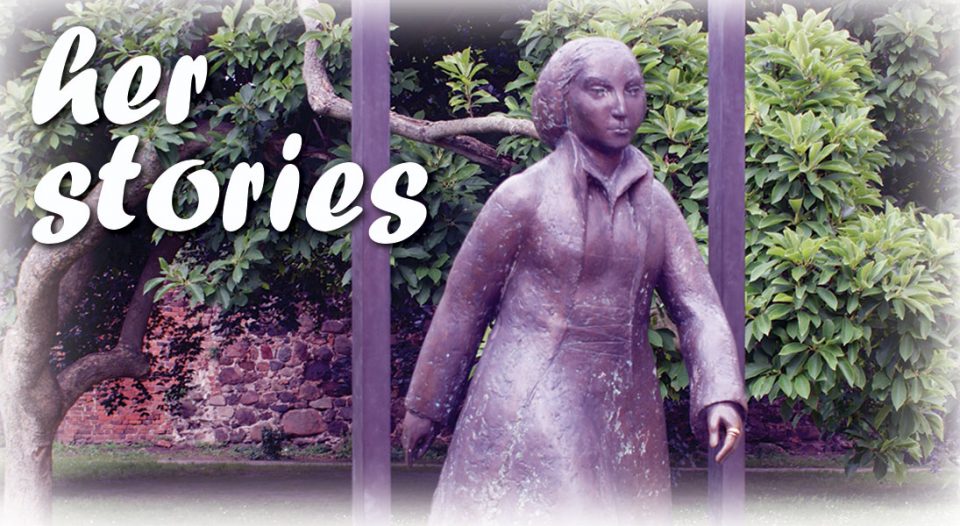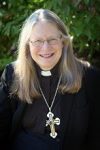Editor’s note: This story is a part of The Lutheran World Federation’s Her-stories global Lutheran storytelling project. If you have a story of how women have reformed the church or influenced your spiritual life, email it to justiceforwomen@elca.org with “Her-stories” in the subject line. Written stories can be up to 1,300 words. Audio/video can be up to five minutes. To learn more about Her-stories and submission guidelines, please click here.
Confession: I know that I am a woman of enormous privilege.
Although I grew up considering myself an ordinary, normal person, I realize that my race, education, social and economic circumstances make me a person of privilege. But regardless of that, I am part of a universal sisterhood of women who have been dismissed, discriminated against, oppressed and attacked simply for being women. This is my story.
Growing up in a middle-class family (our father worked full-time outside the home and our mother worked part-time, sometimes from home), my sister and I were taught that there was nothing that we could not do if we set our sights on it. Our younger brother, who eventually became a flight attendant, heard the same thing.
My first encounter with sexism in the church came in confirmation class when I was 12. The pastor was discussing church careers, describing a variety of church professions: secretary, educator, missionary, musician, pastor. At each description, he asked us to raise our hands if we were interested. I listened to them all and raised my hand at pastor. He was unprepared for this and stumbled over his words.
“B…but you can’t.”
“Why not?”
“B…because our church doesn’t allow it.”
Right then and there I decided that that’s what I wanted to do.
Feminism was in the air, and I was eager to break down barriers that had traditionally stood in the way of women. I was in the third class of women admitted to the historically all-male Yale. While at Yale, I spent a summer working at the national office of the National Organization for Women and helped with the newly organized Yale Undergraduate Women’s Organization.
Following Yale, I went to Harvard Divinity School. When asked why not a Lutheran seminary, the answer was easy. Of all the Lutheran seminaries, only one had a woman on the faculty, and she taught Christian education. And there were very few women students, as well. Given the opportunity to experience a more diverse faculty and student body, I gladly took it. Diversity at Harvard was not only gender. It was also racial, ethnic, religious, political, social and national. It has shaped my approach to ministry.
I was ordained in a group of more than a dozen seminarians, the only woman in the bunch. My first call was to University Lutheran Church in Cambridge, Mass., with campus ministry at Harvard, MIT and Wellesley. While there, I became involved with the World Council of Churches and its Conference on Faith, Science and the Future at MIT. I also became involved in an inter-Lutheran organization called Lutheran Women’s Caucus. Formed in the ferment of the 1970s in American Lutheranism, the Lutheran Women’s Caucus connected women from across the country who longed for the company of other women who were both Lutheran and feminists. In some areas there were chapters, but many of the members were scattered and isolated. I served for several years on the board and edited the newsletter The Well Woman.
When the ELCA was formed in 1988, many people thought that the need for the Lutheran Women’s Caucus no longer. After all, the ELCA had both a Commission for Women and Women of the ELCA, each with board and staff. I did not agree, knowing that the caucus women who were not part of the ELCA had lost their lifeline. At the constituting convention of the ELCA, I was elected to the board of the Commission for Women but had to resign a few months later when my mother, Christine Myers Crist, was chosen to be the director of the Commission for Women. She left a similar position in the Pennsylvania state government to accept the church position.
During this time, I had left Cambridge and moved to Montana, my husband’s home state. We were ready to start a family and enter politics. Montana was way out of my comfort zone, but I was pleased to learn that Montana had elected the first woman to serve in Congress before women even had the right to vote across the country. Jeannette Rankin was elected twice and voted against entry into both world wars.
Our plans did not turn out as we had intended. My husband was stricken with a brain tumor, and I turned a lot of energy into caring for him, as well as our two children. Fortunately, we had enough resources that I did not need to work full-time during this period. I was able to stay connected with ministry throughout, with special emphasis on women’s issues, healing issues, ecumenical issues and education. I was elected the first secretary of the ELCA Montana Synod and served on the Synod Council for 12 years. I was called to direct the continuing education ministry of the synod (the first woman to do so) and served as the first clergywoman to be president of the Montana Association of Churches.
I wrote a column for a women’s magazine monthly for 12 years and chaired the hospital’s women’s health board.
The bishop of the Montana Synod invited me to be on staff. When colleagues asked him, “Do you know what you are getting into?” he responded, “Yes. We are opposites and will serve the church well together.” When he finished his term as bishop and moved on, I was elected the first female bishop of the Montana Synod (also the first woman to be elected a Lutheran bishop in the western United States.)
Two years after I was elected, the ELCA voted to ordain partnered gay and lesbian pastors, and all hell broke loose across the church. Our synod was particularly hard hit, with congregations and individuals leaving the ELCA. In the required consultations, I am convinced that I was attacked more frequently and more viciously than if I had been a man.
Four years after I became the Montana Synod bishop, my colleagues in the ELCA Conference of Bishops elected me to be the chair of the Conference of Bishops. I was the first woman to serve in that capacity. In 2013 another first took place in the ELCA. In the election for presiding bishop, the finalists were three women and one man. Never before had the assembly seen such a ratio, and it seemed a living illustration of the “Always Being Made New” banners around the hall. Elizabeth Eaton was elected to be the presiding bishop, the first woman to hold the position.
During my time as bishop I have watched stained-glass ceilings break. I have watched more women get elected bishop and be chosen as seminary and college presidents and CEOs of faith-based organizations. I have been able to serve as a role model for women and girls not only in our synod but across the country and in other countries. During companion synod visits with the Bolivian Evangelical Lutheran Church, we have worked hard on empowering women, and the same is true with the Cape Orange Diocese in South Africa. I was privileged to ordain the first women to serve as pastors in Bolivia. In my own work, I constantly encourage and empower women and girls into leadership.
I know that I have been blessed, and I am grateful. I am thankful for my feminist husband, Turner Graybill; my feminist biblical scholar daughter, Rhiannon Graybill; and my feminist attorney son, Raphael Graybill. I come from a long line of feminists who have been my inspiration and my support. My hope is that I can be that for others.
Recently I read in a journal where I had an article: “Jessica Crist is an established leader in contemporary American Lutheranism.”
From “no” to “yes!”





